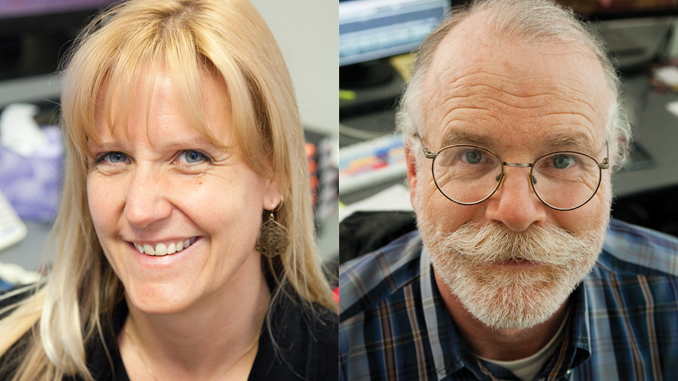by Laura Almo • portraits by Deverill Weekes
Let’s hear it for the longtime assistant for enabling the editor to keep story as the primary focus. Assistant editors are the foundation of the editing room — organizing, interfacing and problem- solving. They have witnessed enormous changes in the industry, from the early days of the filmmaking medium in the studio system to an increasingly tapeless environment. The tools may have changed, but the overall shape of their job remains the same: To be there for the editor so the editor can simply cut.
With the rapid departure of film and the increasing growth of digital filmmaking, “assisting” has taken on new meaning. The mentoring model, where aspiring editors would attach themselves to one editor as an assistant to learn both the art of cutting and the politics of the editing room, has virtually faded away. Once upon a time, an assistant would stand behind the editor, handing him or her trims and taking notes. But today’s assistant works in a separate room and has a different set of responsibilities altogether.
The assistant’s longevity and durability in the industry is to be celebrated. As Lori Coleman, A.C.E., head of the American Cinema Editors internship program, puts it, “The assistant is your wingman, your confidant, your best friend, the heart and soul of the editing room.” Their years of experience is an asset — knowing how to make editors feel like they’re in good hands, keeping an eye on the “big picture” or getting down to nitty-gritty technical details. CineMontage spoke with a sampling of longtime assistants about their career trajectory, what influenced their decision to continue working as an assistant, and their views on a changing industry.
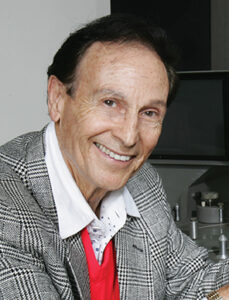
Photo by Gregory Schwartz
RUDY FREEMAN: LIFE UNDER THE STUDIO SYSTEM
Rudy Freeman, who spent the better part of 60 years as an assistant editor at 20th Century Fox Studios, says he chose lifestyle over career. Best known for his legendary collaboration with James Blakely, A.C.E., Freeman, the self-described “health fanatic” and Guild member since 1956, valued sanity and balance over the capriciousness of Hollywood. The clear-minded, silver-tongued nonagenarian, who came up under the studio system, says his early days in the editing room influenced his career path.
“Under the studio system, you pretty much had to work as an apprentice for up to four years, then as an assistant for about another four years before you could even be considered to become an editor,” recalls Freeman. And what he saw in those early days wasn’t pretty. “The film editors at that time were gods,” he continues. “When I got into the business, I had such a bad experience that I was ready to call it quits because some of the editors were ruthless.”
He tells stories of editors short on kindness and long on ego, including this one: As an apprentice, Freeman shared a room with one of Alfred Hitchcock’s editors. “Hitchcock’s editor drew a chalk line right across the room and said, ‘You see this line? You don’t step over this line unless I tell you so.’”
But Freeman developed a thick skin and established himself as someone who was skilled, quick and a pleasure to work with. In fact, while still in his 20s, he was offered a job as an editor but turned it down, feeling that he didn’t have enough experience.
His resume is peppered with TV shows and films such as Peyton Place (1964-69), The Loner (1965-66), The Long Hot Summer (1965-66), Batman (1966-67), The Green Hornet (1966- 67), Paradise Alley (1978), The Main Event (1979) and Predator (1987). Freeman says that on occasion he was given the chance to practice editing, such as on the Batman series, but that, even when he was given another shot at stepping into the editors chair, he thought of his health and overall well-being and politely declined. “I saw too many editors go by the wayside,” he says. “They either died of a heart attack or their marriages didn’t last very long — some of them were married three times. The studio system destroyed people, and I said, ‘That’s not for me.’ That’s why I stayed as an assistant.”
STU SPERLING: I JUST NEVER WANTED TO CUT
For Stu Sperling, a Guild member since 1994, the choice to be an assistant editor was simple: He loves the work. A Baltimore native, Sperling fell in with directors John Waters and Barry Levinson, as well as the local filmmaking scene. Under the tutelage of his mentor, Janice Hampton, A.C.E., he worked on over 10 films, including Hairspray (1988, apprentice editor) and Cry- Baby (1990, second assistant editor). Early on, he learned the joy of collaboration and to this day is still ready to jump in to help out at any stage of post-production.
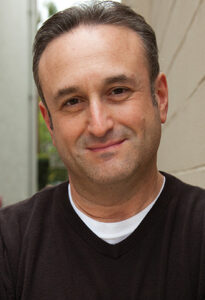 But Baltimore wasn’t a bastion for someone serious about getting into the film industry. So when Hampton suggested he move to LA, Sperling packed up his car and drove west. That was 1990. Within a few weeks, he landed a job as a second assistant on The Rapture (1991), and has been working consistently ever since. Sperling’s credits include some television shows but, for the most part, he has made his career in features: One Fine Day (1996), Sweet Home Alabama (2002), both Sex and the City films (2008, 2010) and the recently released Rock of Ages (2012).
But Baltimore wasn’t a bastion for someone serious about getting into the film industry. So when Hampton suggested he move to LA, Sperling packed up his car and drove west. That was 1990. Within a few weeks, he landed a job as a second assistant on The Rapture (1991), and has been working consistently ever since. Sperling’s credits include some television shows but, for the most part, he has made his career in features: One Fine Day (1996), Sweet Home Alabama (2002), both Sex and the City films (2008, 2010) and the recently released Rock of Ages (2012).
When asked if he ever wanted to become an editor, Sperling answers with the same calm with which he runs his edit room. “It’s funny; a lot of people ask me that,” says Sperling. “I just didn’t. I really love the whole organizing process and technical aspect of it, and I just never really wanted to jump in to editing.”
He emphasizes that it’s not that he hasn’t edited or can’t edit; rather, he really enjoys just sitting down at the Avid (or whatever system he’s using) and organizing — he loves doing the myriad tasks ascribed to the assistant: helping with sound, music and visual effects, and interfacing with different departments. “Let the editors go in their rooms,” he says. “We assistants will deal with the chaos.”
NANCY HURLEY: CHANGING CAREERS
Nancy Hurley is second-generation Hollywood. Her father, Al Bettcher, was a camera operator and, at age 75, a reluctant retiree. Back in 1997, when she wanted to change careers, she looked into the film business. A former secretary, Hurley entered the ACE intern program and, because she already had a family with two small kids, she was determined to get a job with union benefits.
“A lot of other people are really driven to cut, so they’ll take non-union editing jobs — but I was pretty serious about needing benefits,” says Hurley. “That’s what led me to this work in the first place.” One of her first union jobs was working under Tina Hirsch, A.C.E., as an assistant editor on The West Wing (1999-2006). Hurley says it was Hirsch’s patience and mentoring that gave her the self-confidence to master the job.
“If there was something I didn’t understand, she could explain it to me,” says Hurley. “The technical aspect was all really new to me, so it took me a couple of years to catch on. Now that I’ve learned it, it makes me happy to come in and feel like I can control what’s going on. And if it takes me two hours to do something, that’s really the time it takes.” Currently working on the TV series Supernatural (2005-present), Hurley enjoys the assistant job — part organization, part service, part creative — she finds pleasure in it all. “I like feeling like whatever they throw at me I can handle.”
Now that her children are older, there may come a day when she would like to try her hand at editing. But right now, she doesn’t have a desire to cut. “You just have to really want to do it,” Hurley explains. “I’m not sure I really feel a burning need to cut. My job is really pleasant, I like the tasks and they’re varied, and I’m happy doing it.”
CHRISTY RICHMOND: FINDING BALANCE
“Starting a career in editing is no different than getting into any other field — nobody gives it to you,” says Christy Richmond, longtime MPEG member currently representing assistant editors on the Guild’s Board of Directors. “You have to really want it, and you have to be willing to do whatever it takes to get where you want to be.”
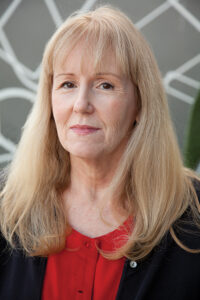 Traditionally, assistants stayed with one editor and eventually that editor would help the assistant move up. But that was starting to change when Richmond got into the business. She says that of the many, many people who helped her, she credits Richard Marks, A.C.E. (The Godfather: Part II, 1974; Terms of Endearment, 1983, Julie and Julia, 2009), as one of her strongest mentors. In fact, she says, it was Marks who advised her to work with as many editors and in as many disciplines of post-production as possible so that she’d know exactly how the whole package comes together.
Traditionally, assistants stayed with one editor and eventually that editor would help the assistant move up. But that was starting to change when Richmond got into the business. She says that of the many, many people who helped her, she credits Richard Marks, A.C.E. (The Godfather: Part II, 1974; Terms of Endearment, 1983, Julie and Julia, 2009), as one of her strongest mentors. In fact, she says, it was Marks who advised her to work with as many editors and in as many disciplines of post-production as possible so that she’d know exactly how the whole package comes together.
Richmond followed Marks’ advice and didn’t align herself with one editor, although she did work on multiple films with Richard Chew, A.C.E. And she did learn all about post-production — picture, sound, music, visual effects — which, over the years, has served her well. She’s worked as an assistant in television and features, including Waiting to Exhale (1995) and Inception (2010). But she’s also worked with visual effects and as a finishing supervisor at a Hollywood facility. Richmond has become so versatile that friends have even dubbed her “the fixer” because of the many times she’s been called in as an assistant to help get a project back on track. Her most recent gig was working as an assistant visual effects editor on Christopher Nolan’s upcoming The Dark Knight Rises.
Richmond, who moved to Los Angeles soon after graduating from college, was on a self-imposed timetable: assistant editor by age 30, full editor by age 35, and first Oscar in the bag at age 50. “I had a hard and fast timeline,” she says. But the transition to digital technology produced a glut of assistants, and making the jump to editor proved to be very difficult. “It became more and more difficult to move up. I saw friends try to move up and have to go back to assisting over and over again because, to get a chance to cut, you often have to work for little or no money,” she says. “Freelancing isn’t for the squeamish.”
There came a point when Richmond realized her aspirations had changed, and she no longer wanted to be an editor. “I’m not really sure if I can put it into words; it’s just something that I felt in my gut,” she offers. “I woke up one morning and realized that this is not really what I want anymore.” She felt the tug between her career and her personal life and then realized that her work had become her life. “It seemed that everyone in my life was in ‘the business’ and that began to feel stifling,” she adds. “It didn’t seem possible to have a fulfilling personal life and also become an editor. To achieve my goal, I needed to fully concentrate on getting ahead, and, of course, there’s no guarantee I would get there.”
Richmond finds working as an assistant to be very gratifying, and considers her years of experience to be an asset. “You have to have a clear vision of the ‘big picture’ so you can stay two to three steps ahead in the workflow,” she explains. “I really enjoy being the assistant, the planner, the organizer, the problem-solver. I still like editing, but I really enjoy assisting!”
ANN TRULOVE: EDITING IS IN HER BLOOD
Ann Trulove, who joined the Guild in 1989, and is now an editor, has gone back and forth from assisting to editing. A storyteller and documentary aficionado, Trulove’s editing credits include the HBO documentary Pretty Things (2005) and the feature Mothers and Daughters (2006). She also worked as an assistant editor on Reindeer Games (2000), The Virgin Suicides (1999) and Wayne’s World (1992). Her vast assisting credits include both TV and film.
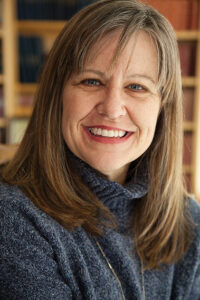 Trulove says when she wanted to make the leap to editor, she was always asked, “Have you cut a feature?” “It was the Catch-22 question,” she says. “So I had to find a feature I could cut. Penelope Spheeris gave me my first feature, The Decline of Western Civilization Part III [1998], and I’m very proud of the fact that that was my first film. Then I could say I cut a feature. I got another feature, and another. And then I was an editor.”
Trulove says when she wanted to make the leap to editor, she was always asked, “Have you cut a feature?” “It was the Catch-22 question,” she says. “So I had to find a feature I could cut. Penelope Spheeris gave me my first feature, The Decline of Western Civilization Part III [1998], and I’m very proud of the fact that that was my first film. Then I could say I cut a feature. I got another feature, and another. And then I was an editor.”
Trulove says she would have pursued editing full-time but, out of financial necessity, continues as an assistant. “But I still want to cut; I still want to win the Oscar,” she claims. She is passionate about film and every facet of the process, and with her many years of experience, feels a sense of ease performing the tasks of both the editor and the assistant.
“I like being in a cutting room; I like the technology as much as I like the story,” Trulove continues. “I love assisting and I’m good at it because I know the whole picture. I know what a supervisor does. I can sit down and watch an online from beginning to end. I can watch a color correction. I’ve done all that. I’ve done every single job that these guys have done, and I’ve done it dozens of times.”
DAVID AUGSBURGER: THE TECHIE
David Augsburger was bound to find his niche as a tech- savvy assistant editor. Growing up in the psychedelic era, he contemplated a career animating light shows but gravitated toward editing while attending USC’s film school. When he was first starting out, his employers thought of him more as a techie. “I wasn’t an assistant editor as far as the employer was concerned,” says Augsburger. “I was just somebody who was learning how to use the equipment.”
Those early systems included the Montage, Touch Vision, Ediflex, Laser Edit and CMX 6000. And learn the equipment he did. Augsburger moved through the ranks from an apprentice sound editor up to assistant picture editor. But getting practice in order to move up to editor proved to be challenging. “When I was working as an apprentice film editor on The Lost Capone [1990], I didn’t get a chance to try any editing because it was a film show,” he says. Soon, he found himself as an assistant editor on the TV series Against the Law (1990-91), which was being edited on the Touch Vision, groundbreaking software that enabled 35mm films to be cut on videotape, using VCRs and a touch screen-controlled computer.
The future of editing — and assistant editing — is evolving. Indeed, the role of the assistant has become more technical over the years.
“All of a sudden you could edit,” says Augsburger. “Before non-destructive editing, the editor couldn’t allow the assistant to cut because you’d be making splices. But once you weren’t altering what the editor had done, there was less of a reason for the editor to say, ‘You can’t do this.’ You could come in early, stay late or practice cutting on the weekend because it was non‐destructive.”
But operating a non‐destructive editing system and assuming the position of editor are very different skill sets, and Augsburger found storytelling more challenging. Over time, he realized that he was better suited to the role of technical go-to guy. “Anytime I would show somebody something that I cut — even though I thought it was good — it turned out that it wasn’t; it’s just something I’m not good at. I’m so fascinated with the technology and the process of making things that I get excited [adding music and sound effects] and I don’t realize that I’m not serving the story.”
It was around the time that Augsburger was working as an assistant editor on Johnny Zero (2004) that he decided he wanted to be the best assistant that he could be. And he is. He’s harnessed his technical wizardry and troubleshooting skills on many a productions, most recently the TV series Body of Proof (2011‐present).
What’s more, Augsburger was one of about a dozen people selected as an ACE Assistant, an honorary role in the American Cinema Editors that has grown out of the ACE internship program. Jenni McCormick, Executive Director of ACE, explains, “It began as a way for the ACE Board to get feedback about what the assistants experience in the cutting room, as well as to help mentor the future of editing.”
The future of editing — and assistant editing — is evolving. Indeed, the role of the assistant has become more technical over the years, observes Richmond. “In my experience, the skill set of assistants vs. editors has changed a great deal,” she reveals. “There was a time when the editor was always the most savvy and knowledgeable person in the editing room, but in regards to the tools we use now, this isn’t always the case. Many editors depend on their assistants to know all the ins and outs of everything, hardware and software, how and why everything works as it does, and how to achieve whatever the objective might be.”
As media-making treads into uncharted territory, it is heartening to know that the industry is so well supported by assistants who possess such expertise and wisdom.


